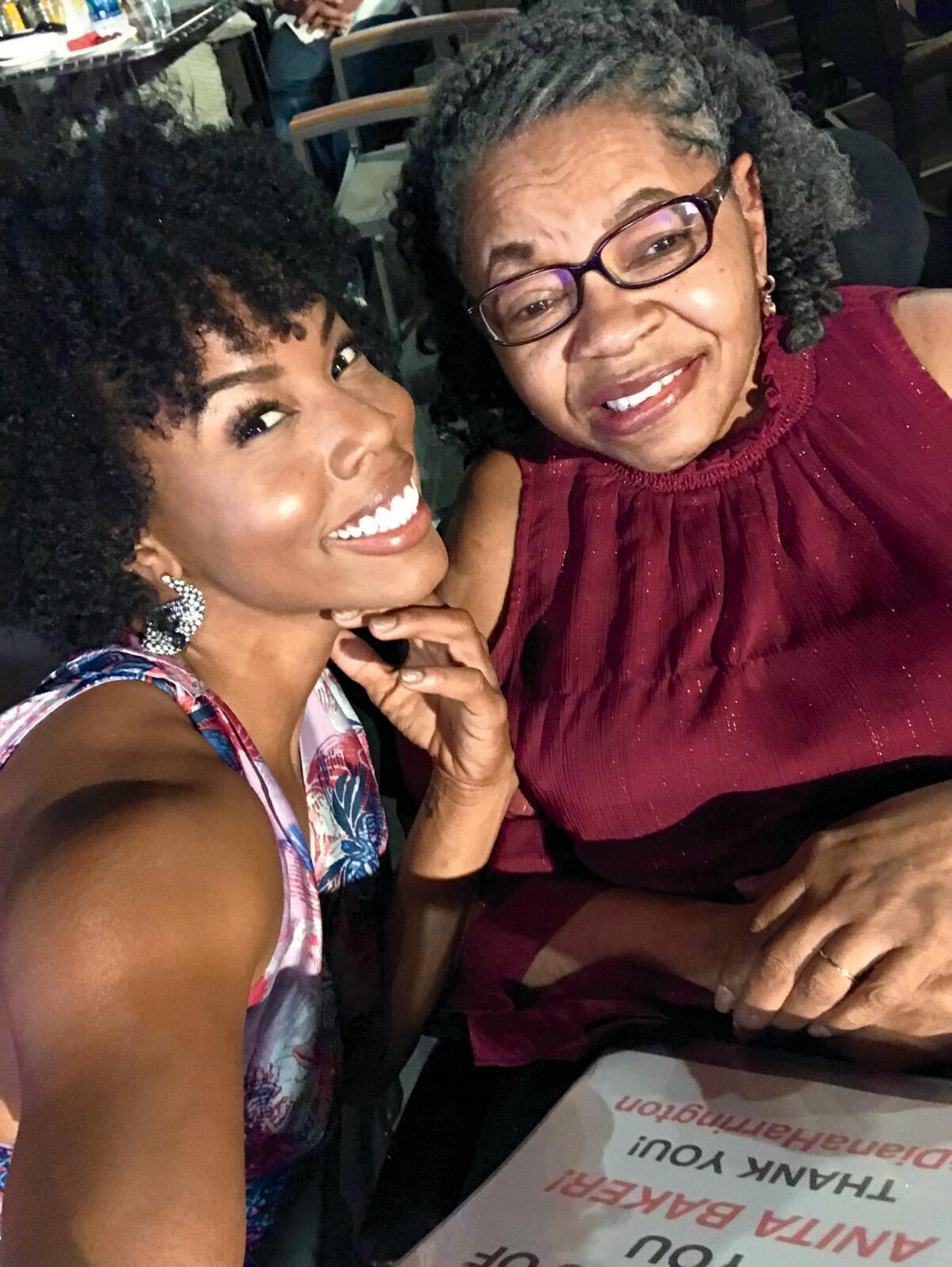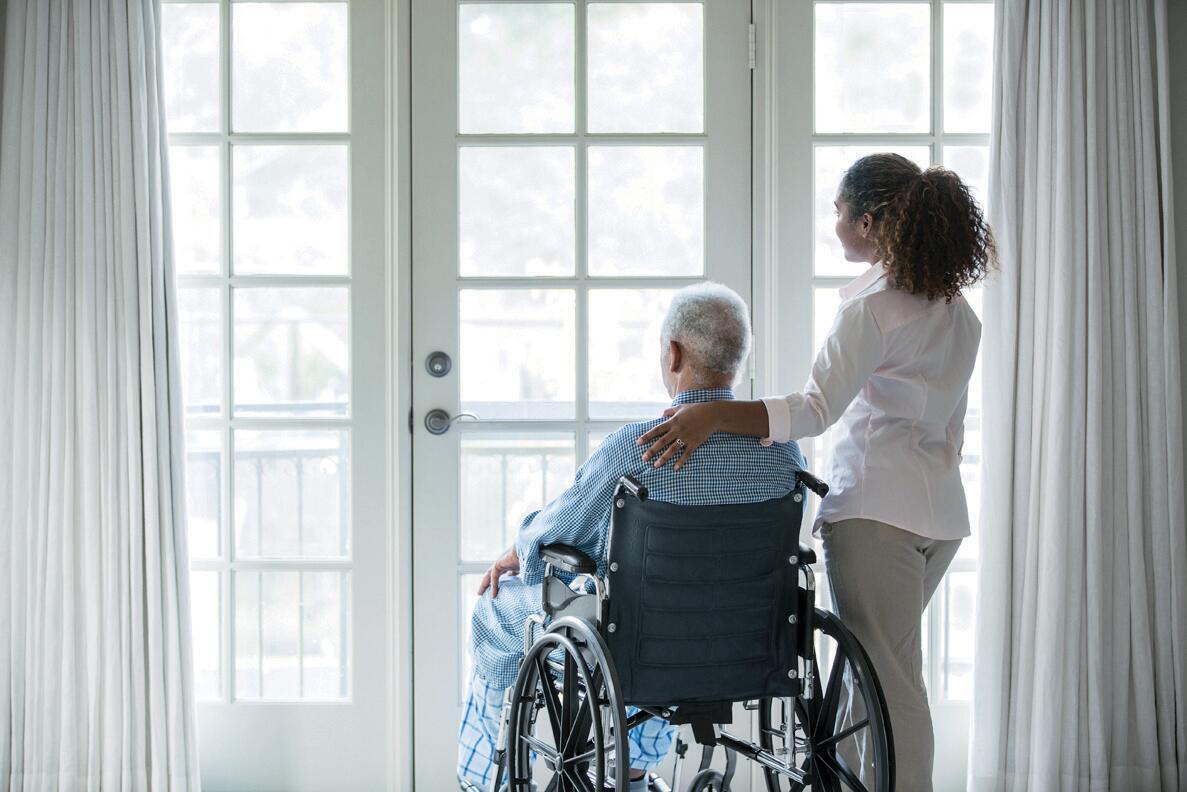
This story originally appears in the November/December 2021 holiday issue of ESSENCE, available on newsstands now.
P-Valley star Brandee Evans is living her dream. Not only is she the lead in a hit TV series, but she has the strong connection with her mom, Diana Harrington, that she’d desired for some time. Though they once had a strained relationship, over the past few years the two have become much closer—attending concerts, traveling together and even getting matching tattoos. Evans just wishes it hadn’t taken a multiple sclerosis diagnosis and a suspected Alzheimer’s battle to get there.
“It’s bittersweet,” she admits. “I always wanted what I have now, which is time with my mom to just have a girls’ day. But it’s also, At what price?” Evans, one of 39.8 million caregivers in the U.S., is among the 48 percent of them between the ages of 18 and 49 who are figuring out how to provide for the needs of a loved one in uncertain times.
In 2004, when family members and friends noticed Harrington’s memory declining and saw that she stumbled often, their concerns led to her being diagnosed with MS, which affects the central nervous system. She managed to remain independent until 2014, but a fall in her Memphis home resulted in a leg injury requiring hospitalization. When Harrington was sent to a nursing home upon discharge, her daughter was devastated.
“It was the one thing that I’d always promised her that I would never do,” Evans says. “My grandma used to work in nursing homes, and so we knew how they were run. I remember having a conversation with my mom when I was a little girl, and she was like, ‘If anything ever happens to me, please don’t put me in a nursing home.’”
For two years Harrington lived in the Memphis facility, receiving care that made her daughter increasingly unhappy. “I would visit and Mom would be dirty, and I felt horrible,” she says. “I was like, They’re not feeding her right. The room’s not clean. It was so depressing.”
At the time, Evans, a choreographer with a burgeoning acting career, was living in Los Angeles. In 2016, believing advancements in nursing care in California would benefit her mother’s health, she decided to move her to L.A. and become her full-time caregiver. She did her research beforehand to better understand what would be required to perform such tasks as feeding and bathing her mom. Evans shared her caregiving journey online and soon found support from strangers, who gave everything from about $14,000 in GoFundMe donations to a wheelchair and van to aid in Harrington’s care. Initially prideful, Evans eventually welcomed the assistance—for her mother’s sake and her own sanity. “Asking for help does not make you weak—that’s what I’ve learned,” she says. “What makes you weak is thinking you can do it all by yourself.”

Evans juggled around-the-clock care with hustling to auditions, to get gigs to pay mounting bills. When she couldn’t get a friend to come over and watch her mother one day, she improvised. “At the P-Valley audition, Mama was on a live-screen video so I could watch her and make sure she was okay,” she says. “I got up early, fed her, and watched her on screen while driving to the audition. Then I went in and did the audition and called her on the way out, to tell her I was on my way home.”
In 2018, Evans was offered the part of Mercedes. A ratings winner, P-Valley was greenlit for a second season by Starz in 2020. The role has given Evans the ability to keep her mom in L.A. It has allowed her to hire two caretakers and a chef, who attend to Harrington’s needs while her daughter films season two in Atlanta. With the cost running close to $20,000 a month for home care, sacrifice is required. Evans still drives the paid-off Ford Fiesta she has had for years, and she stays in an affordable studio apartment when shooting so that Harrington has what she needs. When she’s back in L.A. and looking after her mom, Evans forgoes a glamorous lifestyle to focus on self-care.
“Working out is like therapy, even though I’m in therapy now, too,” she says. “I’ve learned how important it is to do things like that. Getting a therapist, talking things through, exercising, going on a hike and just spending time with myself.”
Evans maintains a joyful spirit as a caregiver by staying mindful of the present and focusing on gratitude. She advises others in stressful caregiving roles to do the same. “I used to pray that I could both live my dream and take care of my mom, and I’m doing that,” she says. “Sometimes I think, Look how far Mom has declined. And then I think, Okay, but she’s declined with you. It helps to just think about the blessings. If we all put the focus on that, it will carry us through those bad days and allow us to remember it’s just a bad day, not a bad life.”

SELF-CARE WHILE CAREGIVING
Siobhan D. Flowers, Ph.D., a licensed psychotherapist based in Dallas, shares how caregivers can prioritize self-care.
It Takes a Village:
“Whether help comes from a sibling, friends, a volunteer organization or even a nonprofit, take off your own cape and do the research to really tap into outlets and resources that are available to you.”
Energy Is Everything: “Building in moments of rest when you can is important. It’s most likely going to require you to set some boundaries—but when you frame it as a necessity, not a luxury, it becomes easier for you to make those shifts.”
Find a Support Group/Journal:
“If you’re an only child going through this, or your family environment isn’t supportive, you need to have a healthy outlet—a safe space where you can process the thoughts and feelings that might come up.”
Show Yourself Compassion:
“This means you need to practice being kind to yourself, and acknowledge all the things that
are going right for you and your loved one, while also gracefully accepting your limitations without judgment.”